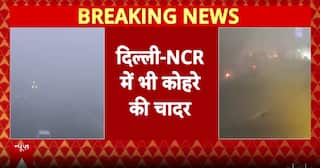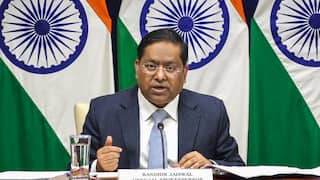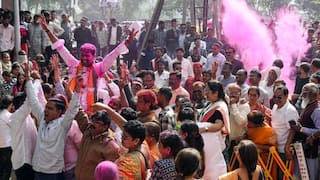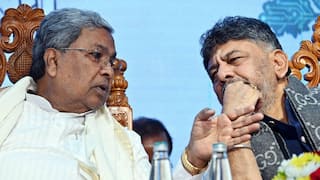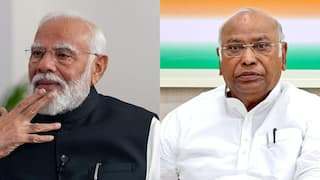Former Pakistan PM Imran Khan Found Guilty Of Corruption, Sentenced To 3 Years In Jail In Toshakhana Case
Former Pakistan PM and Pakistan Tehreek-e-Insaf president Imran Khan has been found guilty of corruption in the Toshakhana case and sentenced to three years imprisonment.

Former Pakistan PM Imran Khan on Saturday was found guilty in the Toshakhana case and sentenced him to three years imprisonment. The Pakistan Tehreek-e-Insaf (PTI) chairman was found guilty of "corrupt practices" by an Islamabad trial court. Along with his prison sentence, Imran Khan has also been fined Rs1,00,000, reported Pakistani news website Dawn.
Soon after the verdict, Khan was arrested from his Zaman Park home in Lahore amid heavy security. He will be taken to Kot Lakhpat jail, PTI tweeted. The party has also decided to appeal in the Islamabad High Court against the verdict, calling it a "political revenge".
The case against Imran Khan was initiated on May 10 after a criminal complaint was filed against him by the Election Commission of Pakistan (ECP) for failing to disclose details of Toshakhana gifts.
ALSO READ | What Is The Pakistan Toshakhana Case? Know What Ex-PM Imran Khan Did That Landed Him In Trouble With Law
During Saturday's hearing, additional district and sessions judge (ADSJ) Humayun Dilawar ruled that the charges against the former prime minister were proven. He stated that Imran Khan deliberately provided false information to the Election Commission of Pakistan, making him guilty of corrupt practices, reported Dawn. As a result, the court sentenced him to three years in jail under Section 174 of the Election Act.
ADSJ Dilawar also ordered that a copy of the verdict should be sent to the Islamabad police chief for the execution of the court's orders.
What Is The Toshakhana Case?
The Toshakhana department was established in 1974 to store gifts and expensive items received by public officials. Officials are required to report their gifts, except for the president and prime minister who can keep gifts below PKR 30,000. The controversy began when Imran Khan, who became prime minister in 2018, refused to disclose details of his gifts under Pakistan's Right To Information law, citing concerns about international relations.
A journalist filed a complaint with the Federal Information Commission, demanding disclosure of Imran Khan's Toshakhana details. The commission instructed the Cabinet Division to comply with the request, but the government failed to do so, leading the requesting party to approach the high court. The Islamabad High Court ordered the government to provide the information, but before that happened, the Pakistan Muslim League-Nawaz took over power.
Members of the National Assembly from the Pakistan Democratic Movement later filed a reference seeking Imran Khan's disqualification. They alleged that he failed to declare the money earned from selling the gifts in his assets and liabilities statement. Khan admitted to selling some gifts at a premium and using the proceeds for construction.
On October 21, 2022, Imran Khan was disqualified from the National Assembly for five years by the Election Commission of Pakistan after concealing facts about selling expensive gifts. The commission found he made a profit of PKR 104.78 million on the retained and sold gifts. Though he followed the procedure for accepting and disposing of gifts, the expulsion was based on intentional and deliberate violations of the law.












